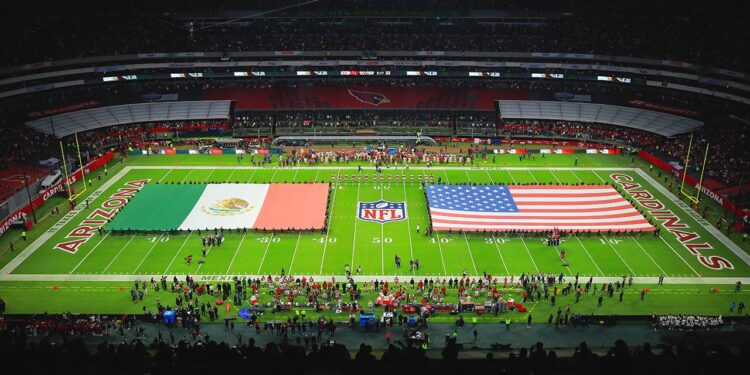 American football has long been a predominantly U.S.-centric sport, with the National Football League (NFL) serving as its global powerhouse. However, in recent years, the sport has increasingly sought to broaden its reach beyond North America, driven by the NFL’s ambition to establish itself as a truly global brand. With an eye on international markets, the league has been actively pursuing strategies to increase viewership, fan engagement, and eventually, the establishment of teams and events in key regions around the world.
American football has long been a predominantly U.S.-centric sport, with the National Football League (NFL) serving as its global powerhouse. However, in recent years, the sport has increasingly sought to broaden its reach beyond North America, driven by the NFL’s ambition to establish itself as a truly global brand. With an eye on international markets, the league has been actively pursuing strategies to increase viewership, fan engagement, and eventually, the establishment of teams and events in key regions around the world.
International Games and Events
One of the NFL’s most visible efforts to promote American football globally has been through its series of international games. The NFL began hosting regular-season games in London in 2007, with the first “NFL International Series” game at Wembley Stadium. This was followed by the introduction of additional games in the UK and the expansion of the international series to cities such as Mexico City and Munich. These events serve as a showcase for the sport, allowing fans from different countries to experience live NFL action and bringing American football to new audiences.
The league’s push into Europe is a key part of its strategy, as countries like the UK, Germany, and Mexico have proven to be fertile ground for growth. The NFL has also worked to build grassroots programs in these regions, from youth leagues to flag football, in an effort to develop homegrown talent and increase local interest.
Global Digital Expansion
The growth of digital platforms has provided the NFL with a powerful tool to extend its global reach. The NFL’s streaming partnerships, such as its collaboration with platforms like Amazon Prime Video and its own NFL Game Pass service, allow fans around the world to watch games live, on demand, and with enhanced viewing experiences. This shift to digital consumption is crucial for a league aiming to connect with a younger, more tech-savvy international audience that may not have access to traditional broadcast networks.
The NFL’s commitment to making its content more accessible internationally is reflected in its deals with international broadcasters, helping the league reach millions of new fans in regions such as Asia, Africa, and South America.
Development of Local Leagues and Talent
The NFL’s vision for global expansion also includes the cultivation of local leagues and talent. By nurturing football at the grassroots level, the NFL aims to build a strong foundation in countries where American football is still a relatively niche sport. Programs like the NFL’s “International Player Pathway” (IPP) allow players from outside the U.S. to train with NFL teams, increasing the pipeline of international talent and offering players a shot at making it to the NFL.
In 2023, the league also announced the creation of the “NFL Flag” program, an initiative designed to introduce the sport to young athletes in non-traditional markets. Flag football has been promoted as a non-contact version of American football that can be played by people of all ages and skill levels, making it an ideal tool for growing the sport globally.
Strategic Partnerships and Marketing
The NFL has been building strategic partnerships with international sports organizations, entertainment companies, and local governments to further its global ambitions. For example, the league’s partnership with TikTok allows it to engage with a younger audience through interactive and viral content. Additionally, partnerships with international sponsors like Pepsi, Nike, and various local companies help promote the NFL brand in global markets, where the sport is still gaining traction.
Marketing campaigns specifically designed for international markets have also been critical. By tailoring content and messaging to different cultures, the NFL is working to break down the perception of American football as solely an American pastime.
Challenges and Road Ahead
Despite its rapid growth, American football faces significant challenges in its quest for global dominance. The sport’s complexity, its reliance on physical contact, and its lengthy game structure can make it difficult for non-American audiences to fully embrace. Moreover, American football competes for attention in crowded sports markets with established global giants like soccer, basketball, and rugby.
The league must continue to innovate in terms of game presentation, fan engagement, and accessibility to keep pace with changing global media consumption habits. Additionally, concerns around player safety, particularly in relation to head injuries, remain a key challenge in maintaining the sport’s long-term appeal.
However, the NFL’s global ambitions are not just about expanding its fanbase—they are also about creating a lasting legacy for the sport. As the league looks to the future, its efforts in developing new markets, forging international partnerships, and growing local talent are essential to ensuring that American football will have a global presence for decades to come.
In summary, the NFL’s push for international expansion marks a new chapter in American football’s history. While there is much work to be done to establish the sport worldwide, the league’s commitment to innovation, international engagement, and fostering global talent suggests that American football’s global footprint will continue to grow in the years ahead. The NFL’s vision for a truly international game is an exciting prospect for both the sport and its fans, as it reaches new corners of the world and fosters a deeper c
onnection with its global audience.

